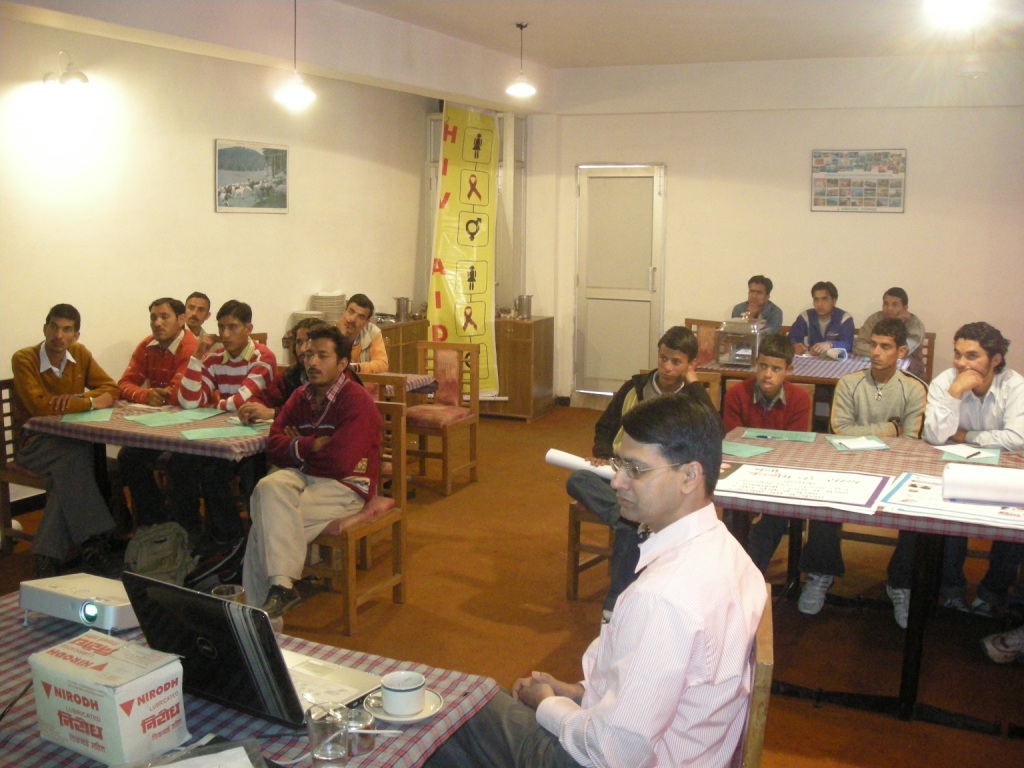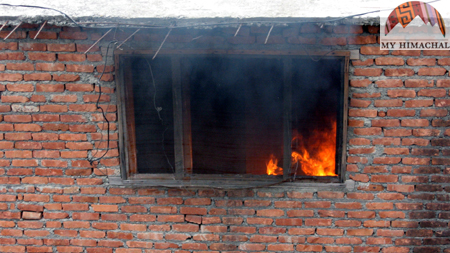
He further elaborated on the key message:
With the advent of effective ART, PLHIV can live longer and healthier lives, akin to lifelong treatment for hypertension which prevents complications.
The benefit of (Free) ART can be availed only if we know our HIV status at an early time, akin to detection heart disease by ECG.
Free and confidential quality HIV counseling and testing is available in 5 ICTCs in the District, where anyone can walk in and get a free counseling and testing facility. He discussed the precise location of the ICTCs within the hospitals for effective referral, mechanism of confidentiality protection, pros and cons of HIV test at private lab versus ICTC. As per the NACO BSS 2006, only 37% of people in HP know the nearest HIV testing facility, we have miles to go before we rest.

Dr Kuldip Sharma Jt Director HPSACS sensitised the participants to the basics of HIV, socio cultural issues. He elaborated on the issues of drug use and alcoholism which predispose to risk behavior. Agrarian society has stability, but within rising unemployment, industrialisation, tourism, displacement and change in livelihood patterns, there was a rise in Sexually transmitted diseases. Economic migration, Late marriage, drug addiction, stigma and lack of women empowerment, patriarchal society increase the vulnerability of youth to HIV infection. Sex is biological phenomenon, our ancient temples have pictures depicting sexuality, but the discussion on sex and STD is still a taboo and we tend to sweep it under the carpet. He stated that there is dichotomy/ discord between what we preach and what we practice- religious leaders preach tolerance, we practice stigma and discrimination. We don’t need to preach morality; we have to be true to oneself. We need to practice abstinence, non sexual mutually faithful relationship, or use condoms to protect ourselves. We are not here for moral intervention; we are for safe blood, safe injection, safe sexual behaviour and safe motherhood.
Manish elaborated on the role of hotel and tourism sector. Prashant, tour operator described the problem of blood scarcity and potentially unsafe injections. Rohit, a young student elaborated the common modes of transmission. Another young student, Satish added the mother to child transmission. Manish asked the participants how a positive person will look like. Prashant, tour operator told that HIV positive will look weak and lost a lot of weight. Manish clarified that we cannot know HIV status from the face and person is asymptomatic for a long time, till then he/ she will not seek medical care he can infect others. We don’t act now HIV will increase to alarming proportions and impact our livelihood industry and economy.
Individually, we are young and vulnerable, we have right to know how to protect ourselves and out tourist clients. He addressed the myth of invincibility and that “I can’t be infectedâ€. Some groups like commercial sex workers, injecting drug users, men having sex, tourism related professionals with men are at high risk. We need to know about the correct technique of condom use. We can reduce the risk of HIV associated with this profession.
Dr Surinder Singh Ex DPO discussed the issue of blood scarcity, importance of voluntary blood donation in blood safely and HIV prevention and addressed the fears and misconceptions of weakness related to blood donation. Blood is a life saving medicine, which works wonders in certain diseases. lt is an emergency medicine. Our society is today threatened by scarcity of blood. Any person between the age of 18- 60, with weight more than 45 kg can donate blood and the body replenishes the 350 ml in 48 hours, and red blood cell in 3 months. He also asked the participants to organise blood donation camps.
Mr Rajinder Kumar, MEIO discussed the communication skills, and counseling techniques for effective dissemination of message. He emphasised that non verbal communication is crucial to making the people realise the risk and need for safe sex and safe behaviour, and access services. Mr Balbir Rana, Tourist Information Officer stated that HIV prevention is critical to survival of tourism industry, the activities that can be taken up include provision condoms in hotels, incorporation of HIV education regular trainings of tourism department, and having a policy on HIV, for which some advocacy at the state level needs to be done.
As part of the mainstreaming campiagn in the Dsitrict, mid level managers of Rural Develoment and Department of Social Justice and Empowerment were sensitised in Dsitrct level advocacy campaign. They agreed in principle to integrate the HIV issue into their regular meetings and trainings, these department have a large number of programmes and field staff with wide outreach, and their active role will go a long way in the HIV awareness, and displeiing myths and stigma associated with HIV/AIDS. The performance of anganwari workers will be assessed by supervisors and the best performers will be rewardrd. The campaign is expected to increase the utilidation of ICTC services by five folds.



